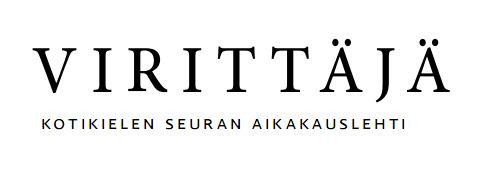Nykyvatjan koodinvaihdosta
Avainsanat:
vatja
Abstrakti
Code-switching in modern Votic (saksa)2/1997 (101)
Mikko Turunen (University of Tampere; skmitu@uta.fi)
CODE-SWITCHING IN MODERN VOTIC
The article examines the mixing of languages and the code-switching into Russian which are characteristic of modern Votic. In their speech, present-day speakers of Votic use several languages (mostly Ingrian, Votic and Russian, sometimes Estonian and Finnish as well), and constantly switch between them. Modern Votic is actually a mixed language of Ingrian and Votic, with a strong element of Russian. Speakers have a tendency to switch to using Russian, and it is just these switches which are examined in the article. The data consists of material recorded by the writer in Votic villages in the Vainpuoli area during summer 1992, and the corpus collected by Petri Lauerma from the same area in 1990. The present status of modern Votic as a mixed language is also a theoretically challenging basis for research into code-switching.
The multilingual environment of Ingria creates the preconditions for the mixing of languages and for code-switching between different languages, common in modern Votic. It might be questioned whether modern Votic is any longer a 'language' in the social sense, or whether it should be seen as a collection of several idiosyncratic languages or even idiolects. Although command of several languages provides plenty of alternative expressions, in the case of Votic it has furthered the extinction of the language. Borrowing is also characteristic of modern Votic, as speakers have had a great deal of language contact.
A distinct trigger can sometimes be identified for code-switching. At the linguistic level this trigger is usually a single word or expression from another language, and at the psychological level it can be, for instance, an association. The trigger activates the speaker to use another code. It might be a saying or a borrowed idiom that directs the speaker to use the other language. With speakers of Votic, code-switching does not obey any particular set of conditions, and so its occurrence cannot be predicted. Moreover, code-switching events in Votic are typically difficult to analyse, because of the continual switching from one language code to another.
A mixed code might be the best definition for describing the speech of present-day speakers of Votic. On a historical timescale, it is already possible to talk of Votic as a substrate and a dying language. Linguistic assimilation with speakers of the dominant language will eventually lead to the death of Votic, even though it is not yet possible to say whether the language will disappear first or whether it will die along with the last speakers.
Viittaaminen
Turunen, M. (1997). Nykyvatjan koodinvaihdosta. Virittäjä, 101(2), 208. Noudettu osoitteesta https://journal.fi/virittaja/article/view/38960





